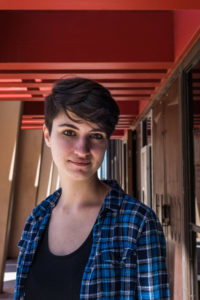Tags
Related Posts
Share This
Fogelson Library Research Award Winners
Spiritual filmmaking, empowered witches and psychedelic drugs—this year’s Fogelson Research Library Award winners have it all.
Headed by Director of Library Services Margaret Van Dyk, Santa Fe University of Art and Design’s Fogelson Library has annually celebrated outstanding achievements of academic writing of freshman and sophomore students with the Library Research Award.
Since its inception in 2012, the award has improved in popularity, quality of nominations and prize money. Professors of Writing Roundtable classes can submit, to Director of the Writing Center Hideki Nakazono, up to two exceptional research papers from their students for consideration, based on the following criteria: original thinking established in the thesis statement and supported throughout the paper; discourse between original writing and relevant scholarship; application of scholarly resources, evidence of extensive engagement with Fogelson Library print and electronic resources on Works Cited page; and proper use of MLA format and citation. From the submissions, the Fogelson Library Research Award Committee chooses three winners to receive the cash prizes of $300 (first place), $200 (second place) and $100 (third place). Prize money is raised through the Friends of the Fogelson Library through its weekly book sale in the basement of the library. Besides money, winning students also get their photograph added to the Wall of Award Winners in Fogelson (shot by SFUAD photography students) and will be able to include the honor on their curriculum vitaes, resumes and graduate school applications.

Freshman Film School major Addison Standley. Photo by Sasha Hill
For the 2016 award year (which includes Spring of 2015 and Fall of 2016), the three winners were Addison Standley (first place), Madeleine Sardina (second place) and CJ Rodrigues (third place). Both Sardina and Rodrigues were nominated by professor Evelyn Malinowski, and Standley by Mary Ann Wamhoff.
Addison Standley, a Film School freshman, wrote about his favorite film director, Terrence Malick, who tends to have underlying spiritual themes and allusions, and how Malick interrogates those themes in his work visually and in editing. While Standley doesn’t feel like his writing style for the winning essay was any different than any of his other papers, he admits that it’s one of the best essays he’s written. “I guess what stood out is, perhaps, I went into quite a bit of detail in terms of how Malick depicts his themes visually and thematically, going into detail about various scenes and spiritual texts in relation to those themes,” Standley explains. He was very pleased with his win and prize, especially noting how difficult the essay was to write: “I’m a perfectionist, so, you know, it was nice to have that effort be recognized.” He would especially like to thank Wamhoff for submitting his paper, and feels very grateful that she liked it so much.

Creative Writing and Literature senior Madeleine Sardina. Photo by Sasha Hill
As a first-semester creative writing senior, Madeleine Sardina’s essay was written in her second semester of her sophomore year for Malinowski’s Shakespeare, Women and Gender class. Her paper interrogated the portrayal of the witches in Macbeth in relation to the historical context of how older women were perceived and treated during the play’s time of writing. “Basically it was about Shakespeare using conventional ideas of old women and witches being evil to make fun of the king of the time,” she explains. Sardina also notes that she worked very hard on the piece with Malinowski and became very invested in her research about the historic treatment of older women. She focused a lot on that aspect of her writing process, including using many of the database sources from the Fogelson website.

Sophomore Musical Theatre student CJ Rodriguez. Photo by Sasha Hill
Sophomore theatre student CJ Rodrigues also had Malinowski for his Writing Roundtable, with his research thesis looking at LSD and MDMA’s potential use for psychotherapy. Rodrigues explains: “The treatments that they’re now discovering—well, it’s things that they’ve studied a long time ago before the drugs were classified as controlled substances by the United States government in 1984 or something and haven’t been changed since then – so it’s just about how other countries and the United States are finding what uses LSD and MDMA can be if they isolate certain characteristics of their chemical compounds. So like it could treat dementia, Alzheimer’s and things like that.[…] I was interested especially in how the drugs can effect empathy.” He also notes that he checked in with Malinowski often about the progress of the essay, more than he normally would, and cited as many sources he could. When asked how he felt about his award placement, he said it feels really cool of course, but also how great it feels to be acknowledged academically and appreciated by the community.
More information about the award and its guidelines can be found on the Fogelson Library website.






 Jackalope Magazine is the student magazine of Santa Fe University of Art and Design. Building on the interdisciplinary nature of our education, we aim to showcase the talent of our university and character of our city.
Jackalope Magazine is the student magazine of Santa Fe University of Art and Design. Building on the interdisciplinary nature of our education, we aim to showcase the talent of our university and character of our city.
Recent Comments